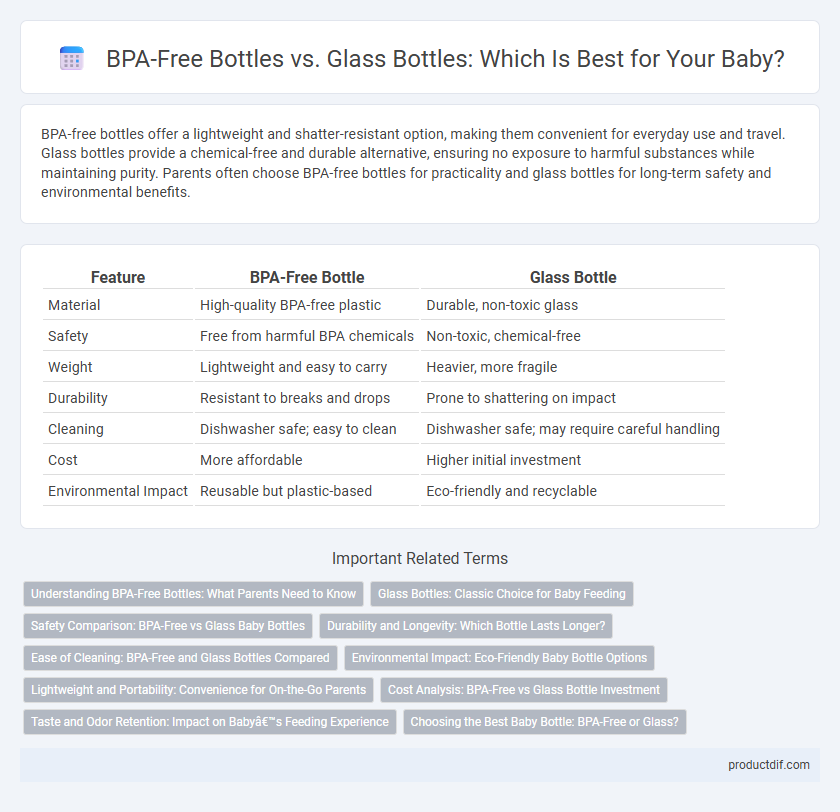BPA-free bottles offer a lightweight and shatter-resistant option, making them convenient for everyday use and travel. Glass bottles provide a chemical-free and durable alternative, ensuring no exposure to harmful substances while maintaining purity. Parents often choose BPA-free bottles for practicality and glass bottles for long-term safety and environmental benefits.
Table of Comparison
| Feature | BPA-Free Bottle | Glass Bottle |
|---|---|---|
| Material | High-quality BPA-free plastic | Durable, non-toxic glass |
| Safety | Free from harmful BPA chemicals | Non-toxic, chemical-free |
| Weight | Lightweight and easy to carry | Heavier, more fragile |
| Durability | Resistant to breaks and drops | Prone to shattering on impact |
| Cleaning | Dishwasher safe; easy to clean | Dishwasher safe; may require careful handling |
| Cost | More affordable | Higher initial investment |
| Environmental Impact | Reusable but plastic-based | Eco-friendly and recyclable |
Understanding BPA-Free Bottles: What Parents Need to Know
BPA-free bottles are made from safe plastics that do not contain Bisphenol A, a chemical linked to health risks in infants. These bottles offer lightweight durability, shatter resistance, and easier handling compared to glass bottles. Understanding the benefits and materials of BPA-free bottles helps parents make informed decisions for safer feeding options.
Glass Bottles: Classic Choice for Baby Feeding
Glass bottles offer a classic and safe choice for baby feeding, renowned for their durability and resistance to chemical leaching unlike plastic options. They provide a natural, non-toxic option free from harmful substances such as BPA or phthalates, ensuring infant health and safety. Their ease of sterilization and longevity make glass bottles a preferred option for parents prioritizing hygiene and environmental sustainability.
Safety Comparison: BPA-Free vs Glass Baby Bottles
BPA-free bottles offer a safer alternative to traditional plastic by eliminating harmful bisphenol A, reducing risks of hormone disruption. Glass baby bottles provide superior chemical stability and are free from toxins, making them ideal for parents prioritizing long-term safety and environmental impact. Both options ensure safer feeding choices compared to conventional plastics, but glass is preferred for durability against chemical leaching.
Durability and Longevity: Which Bottle Lasts Longer?
BPA-free bottles, typically made from durable polypropylene or Tritan plastic, offer excellent resistance to impact and less risk of breakage compared to glass bottles. Glass bottles, while free from chemicals like BPA and maintaining purity, are prone to chipping and breaking upon impact, reducing their overall longevity. For prolonged daily use and durability, BPA-free bottles generally last longer in active baby care environments.
Ease of Cleaning: BPA-Free and Glass Bottles Compared
BPA-free bottles typically feature wide necks and smooth surfaces, making them easier to clean by hand or in dishwashers compared to some glass bottles that may have narrow openings or intricate designs. Glass bottles, while resistant to stains and odors, require careful handling to avoid breakage, and their heavier weight can complicate thorough cleaning routines. Both materials benefit from regular sterilization, but BPA-free bottles offer more versatility in cleaning tools, enhancing convenience for busy parents.
Environmental Impact: Eco-Friendly Baby Bottle Options
BPA-free bottles reduce chemical risks but often contain plastic derived from fossil fuels, contributing to environmental pollution and plastic waste. Glass bottles offer a sustainable, non-toxic alternative that is recyclable and long-lasting, minimizing landfill accumulation. Choosing glass baby bottles supports eco-friendly practices by reducing reliance on single-use plastics and promoting a healthier planet for future generations.
Lightweight and Portability: Convenience for On-the-Go Parents
BPA-free bottles offer a lightweight design that enhances portability, making them ideal for parents who need a convenient feeding solution while traveling or running errands. Glass bottles, though durable and chemical-free, tend to be heavier and more fragile, which can limit ease of transport and increase the risk of breakage. For on-the-go convenience, BPA-free bottles provide a practical balance of safety and mobility.
Cost Analysis: BPA-Free vs Glass Bottle Investment
BPA-free bottles generally have a lower upfront cost compared to glass bottles, making them a budget-friendly option for many parents. Glass bottles, while pricier initially, offer longer-term savings due to their durability and resistance to wear and tear, reducing replacement frequency. Factoring in the potential health benefits and environmental impact, the investment in glass bottles often aligns with sustainable parenting choices.
Taste and Odor Retention: Impact on Baby’s Feeding Experience
BPA-free bottles often feature advanced plastic materials designed to minimize taste and odor retention, ensuring a neutral flavor that promotes a pleasant feeding experience for babies. Glass bottles are naturally non-porous and resistant to retaining odors or flavors, preserving the original taste of breast milk or formula. Both options support a positive feeding experience by maintaining freshness, but glass bottles offer superior odor and taste neutrality, which can be crucial for sensitive infants.
Choosing the Best Baby Bottle: BPA-Free or Glass?
Choosing the best baby bottle involves weighing the benefits of BPA-free plastic and glass options; BPA-free bottles offer lightweight durability and chemical safety by eliminating bisphenol A, a harmful endocrine disruptor. Glass bottles provide a non-toxic, long-lasting alternative that resists scratches and retains purity without leaching chemicals, though they can be heavier and prone to breakage. Prioritizing safety, ease of cleaning, and durability helps parents select the ideal bottle tailored to their baby's health and lifestyle needs.
BPA-Free Bottle vs Glass Bottle Infographic

 productdif.com
productdif.com